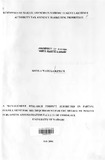| dc.description.abstract | This study sort to investigate the responses of Matatu Owners in Nairobi to Kenya Revenue Authority Tax Amnesty Marketing Promotion. To achieve this Matatu Owners in Nairobi were asked to give their responses to the Tax amnesty promotion introduced by KRA and to establish the factors that may have influenced the responses to the marketing promotion by KRA if any.
This was a descriptive study, which targeted all matatu owners registered with Matatu Owners Association Nairobi. Convenience sampling method was used to select the matatu owners interviewed. Primary data was collected using a semi-structured questionnaire. Out of the targeted 30 respondents, a response rate of 93% was achieved. Collected data was analyzed using descriptive statistics i.e. frequencies, percentages, mean scores and standard deviations. Likert scale was used to measure the responses of Matatu Owners in Nairobi to KRA amnesty Marketing Promotion.
From the study it was found that the KRA tax amnesty marketing promotion campaign in the form of publicity, tax clinics, messages and tax amnesty literature reached most of the target groups and was also viewed as communicative, understandable, interesting, educative, credible and well coordinated. The respondents felt more patriotic were induced to settle tax arrears, informed others about the tax amnesty and viewed the tax amnesty as an incentive. Most of the respondents now pay additional taxes other than the mandatory taxes. However, most of the respondents reported that they were reluctant to pay taxes promptly post tax amnesty.
Some of the respondents were not enthusiastic in responding to the questionnaire as appropriately possible. This could be attributed to the fact that the research was on tax matters which are considered very sensitive' and the respondents might have feared that information gathered might be used against them despite assurances that any information disclosed would be treated in strict confidence. This could have also influenced the response of those who answered the questionnaires.
A similar study should be carried out in other industries as well as in the other towns, as this could give a more holistic view on the response towards KRA tax amnesty marketing
promotion. | en |

